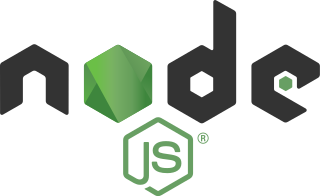
The Document Object Model (DOM) is a cross-platform and language-independent interface that treats an HTML or XML document as a tree structure wherein each node is an object representing a part of the document. The DOM represents a document with a logical tree. Each branch of the tree ends in a node, and each node contains objects. DOM methods allow programmatic access to the tree; with them one can change the structure, style or content of a document. Nodes can have event handlers attached to them. Once an event is triggered, the event handlers get executed.

Server-side scripting is a technique used in web development which involves employing scripts on a web server which produces a response customized for each user's (client's) request to the website. Scripts can be written in any of a number of server-side scripting languages that are available. Server-side scripting is distinguished from client-side scripting where embedded scripts, such as JavaScript, are run client-side in a web browser, but both techniques are often used together. The alternative to either or both types of scripting is for the web server itself to deliver a static web page.

Bluefish is a free and open-source software advanced text editor with a variety of tools for programming and website development. It supports coding languages including HTML, XHTML, CSS, XML, PHP, C, C++, JavaScript, Java, Go, Vala, Ada, D, SQL, Perl, ColdFusion, JSP, Python, Ruby, and shell. It is available for many platforms, including Linux, macOS and Windows, and can be used via integration with GNOME or run as a stand-alone application. Designed as a compromise between plain text editors and full programming IDEs, Bluefish is lightweight, fast and easy to learn, while providing many IDE features. It has been translated into 17 languages.
In computing, a solution stack or software stack is a set of software subsystems or components needed to create a complete platform such that no additional software is needed to support applications. Applications are said to "run on" or "run on top of" the resulting platform.
Hessian is a binary Web service protocol that makes Web services usable without requiring a large framework, and without learning a new set of protocols. Because it is a binary protocol, it is well-suited to sending binary data without any need to extend the protocol with attachments.
Selenium is an open source umbrella project for a range of tools and libraries aimed at supporting browser automation. It provides a playback tool for authoring functional tests across most modern web browsers, without the need to learn a test scripting language. It also provides a test domain-specific language (Selenese) to write tests in a number of popular programming languages, including JavaScript (Node.js), C#, Groovy, Java, Perl, PHP, Python, Ruby and Scala. Selenium runs on Windows, Linux, and macOS. It is open-source software released under the Apache License 2.0.
WURFL is a set of proprietary application programming interfaces (APIs) and an XML configuration file which contains information about device capabilities and features for a variety of mobile devices, focused on mobile device detection. Until version 2.2, WURFL was released under an "open source / public domain" license. Prior to version 2.2, device information was contributed by developers around the world and the WURFL was updated frequently, reflecting new wireless devices coming on the market. In June 2011, the founder of the WURFL project, Luca Passani, and Steve Kamerman, the author of Tera-WURFL, a popular PHP WURFL API, formed ScientiaMobile, Inc to provide commercial mobile device detection support and services using WURFL. As of August 30, 2011, the ScientiaMobile WURFL APIs are licensed under a dual-license model, using the AGPL license for non-commercial use and a proprietary commercial license. The current version of the WURFL database itself is no longer open source.

Aptana, Inc. is a company that makes web application development tools for use with a variety of programming languages. Aptana's main products include Aptana Studio, Aptana Cloud and Aptana Jaxer.

ActiveState Software Inc is a Canadian software company headquartered in Vancouver, British Columbia. It develops, sells, and supports cross-platform development tools and secure software supply chain solutions for dynamic languages such as Perl, PHP, Python, Ruby, and Tcl, as well as enterprise services.

libvirt is an open-source API, daemon and management tool for managing platform virtualization. It can be used to manage KVM, Xen, VMware ESXi, QEMU and other virtualization technologies. These APIs are widely used in the orchestration layer of hypervisors in the development of a cloud-based solution.

Node.js is a cross-platform, open-source server environment that can run on Windows, Linux, Unix, macOS, and more. Node.js is a back-end JavaScript runtime environment, runs on the V8 JavaScript engine, and executes JavaScript code outside a web browser.
CommonJS is a project to standardize the module ecosystem for JavaScript outside of web browsers.

Cloud9 IDE is an Online IDE, published as open source from version 2.0, until version 3.0. It supports multiple programming languages, including C, C++, PHP, Ruby, Perl, Python, JavaScript with Node.js, and Go.

Eclipse Vert.x is a polyglot event-driven application framework that runs on the Java Virtual Machine.
Jelastic is a cloud platform software vendor that provides multi-cloud Platform as a Service-based on container technology for hosting service providers, ISVs, telecommunication companies, enterprises and developers. The platform is available as public cloud in over 70 data centers, as well as virtual and on-premises servers. Jelastic provides support of Java, PHP, Ruby, Node.js, Python, Go environments, custom Docker containers and Kubernetes clusters.
Codeanywhere is a cross-platform cloud integrated development environment (IDE) created by Codeanywhere, Inc. Codeanywhere enables users to write, edit, collaborate, and run web development projects from a web browser or mobile device.

Replit, formerly Repl.it, is a San Francisco-based start-up and an online integrated development environment (IDE). Replit being Software as a service (SaaS) allows users to create online projects and write code. Replit has a global community for programmers to interact and offers Teams for Education, a product to assist in teaching programming in the classroom.
The following outline is provided as an overview of and topical guide to web design and web development, two very related fields:








